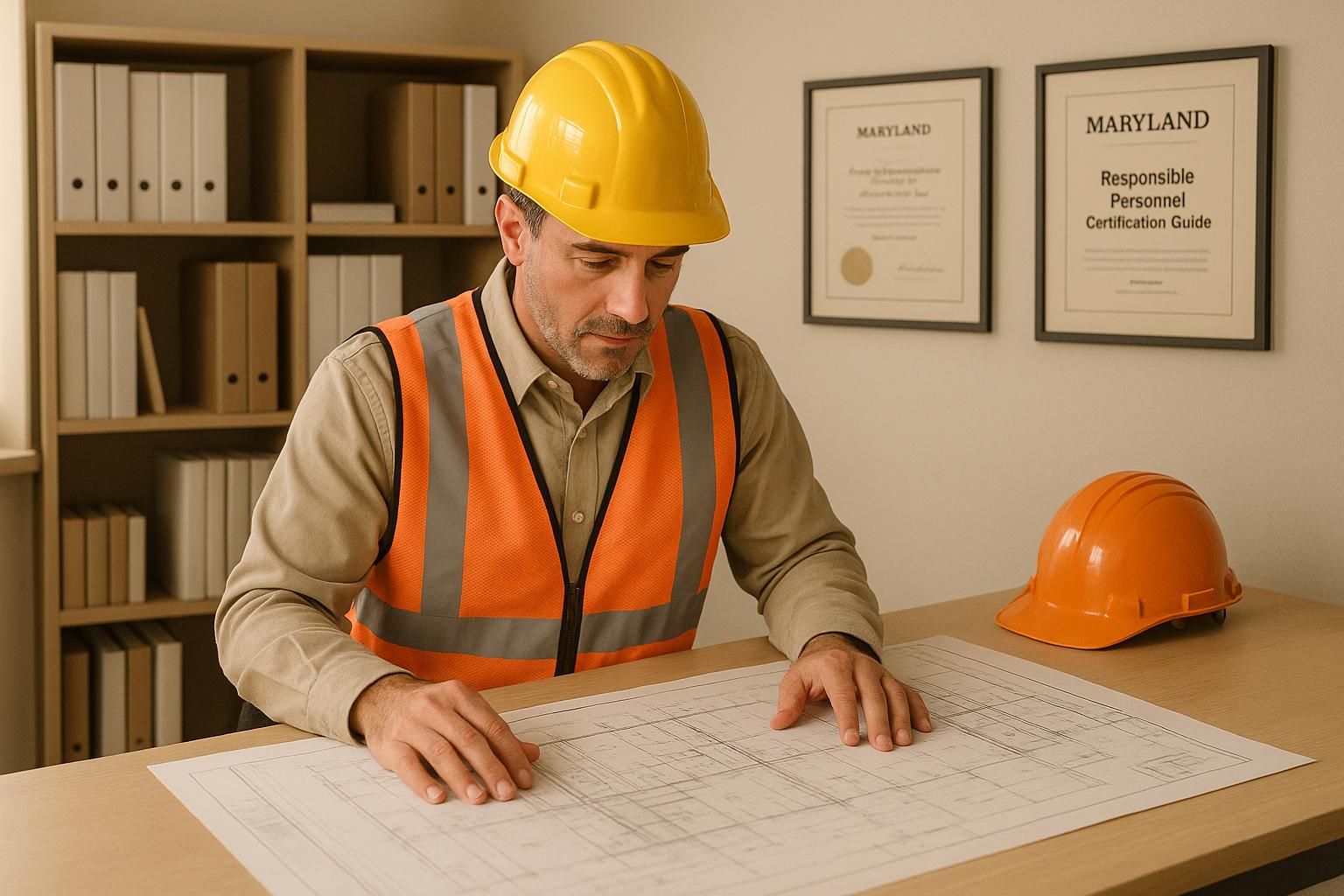- bhavya gada
- No Comments
The Maryland Responsible Personnel Certification (RPC) is a legal requirement for professionals overseeing erosion and sediment control on construction sites. This certification ensures field personnel are trained to prevent soil erosion and protect water systems during construction projects. Here’s what you need to know:
- Who Needs It: Supervisors, engineers, and compliance officers managing erosion and sediment control on construction sites.
- Why It’s Required: Maryland law mandates certification to protect natural resources, prevent flooding, and ensure compliance with sediment control standards.
- How to Get Certified:
- Complete a Maryland Department of the Environment (MDE)-approved training course.
- Pass the certification exam.
- Apply online (free of charge).
- Validity: Certification lasts 3 years and renews automatically unless additional training is required.
This process equips professionals to implement proper erosion control measures, ensuring compliance with Maryland regulations and minimizing project delays or penalties.
MDE Guidance For Protecting Stormwater Best Management Practices During Construction November 2023
Requirements for Certification
To earn Maryland’s Responsible Personnel Certification, applicants must meet the Maryland Department of the Environment (MDE) eligibility criteria and submit the necessary paperwork.
Who Can Apply
This certification is tailored for construction professionals responsible for on-site sediment control. Eligible roles include foremen, superintendents, and project engineers who oversee clearing, grading, or sediment control activities on-site [1][3].
To qualify, you must be actively involved in construction projects requiring erosion and sediment control measures. These projects often include residential developments, commercial buildings, road construction, utility work, and other activities that disturb the soil. The certification is specifically aimed at field personnel with decision-making authority to implement proper erosion control techniques and ensure compliance throughout the construction process.
Government employees applying for the certification can take advantage of reduced government rates [4]. This discount acknowledges the critical contributions of public sector workers to Maryland’s construction and infrastructure projects.
Additionally, projects involving four or fewer residential units may qualify for a waiver from the responsible personnel requirement, pending government approval [3].
Once eligibility is confirmed, the next step is to gather the required documents to complete the certification process.
Required Documents
To become certified, applicants must attend an MDE-approved training class and pass the associated exam [1].
A training certificate is mandatory before starting any construction project [3]. This means certification must be secured prior to breaking ground – it’s not something that can be completed during or after the project.
The training class covers essential erosion and sediment control techniques and best management practices. This knowledge is a cornerstone of Maryland’s sediment control program [1]. The exam ensures that participants can effectively apply these techniques in practical construction scenarios.
The certification is valid for three years and renews automatically unless MDE determines that additional training is required [1]. This automatic renewal process minimizes administrative hurdles while still allowing the Department to mandate updated training when regulations or best practices evolve.
Maryland’s certification process prioritizes practical, hands-on knowledge over excessive paperwork. By focusing on training and testing rather than complex documentation, the state ensures that qualified construction professionals can easily access the certification while maintaining high environmental standards.
How to Get Certified
If you’re looking to implement erosion and sediment controls in Maryland, obtaining the Maryland Responsible Personnel Certification is a must. Here’s how you can secure your certification step by step.
Complete the Required Training
The Maryland Department of the Environment (MDE) provides an online erosion and sediment control training course [2]. This course, previously referred to as the "Green Card" [2], teaches essential techniques and standards for managing erosion and sediment control in the field. To get started, you can find a list of approved training courses on the MDE website [2].
Pass the Certification Exam
Once you’ve completed the training, you’ll need to pass an exam that assesses your knowledge and ability to apply erosion and sediment control practices effectively [1].
Apply for Certification
After passing the exam, you can submit your application online – completely free of charge [1]. The certification remains valid for three years and will automatically renew unless additional training is required [1].
Renewing Your Certification
Here’s how to keep your Maryland RPC compliance up to date without any gaps.
Certification Length and Renewal Process
Once issued, your certification remains valid for three years. The good news? It renews automatically at no cost – unless the Department specifies additional training is needed. If new training is required, the Department will notify you directly [1].
sbb-itb-843f8be
Benefits of Getting Certified
Earning your Maryland Responsible Personnel Certification isn’t just about ticking a box for state requirements – it’s about equipping yourself with the tools to ensure smoother projects, safer worksites, and adherence to regulations.
Staying Compliant with Maryland Regulations
Maryland law requires every county and municipality to implement erosion and sediment control programs, making certification a must for legal compliance [5]. Without it, projects risk facing serious consequences like administrative penalties, fines, criminal charges, or even stop work orders [5].
Certified personnel not only understand the legal framework but also know how to implement the necessary measures effectively. This knowledge reduces the chances of delays or penalties while ensuring projects stay on track.
Achieving Better Project Outcomes
Certified professionals bring expertise in erosion control techniques that reduce sediment yield and manage runoff effectively [1][5]. Their training ensures proper installation and maintenance of erosion controls, which play a critical role in:
- Reducing sediment yields
- Filtering and managing runoff
- Lowering runoff volume and velocity
- Containing sediment on-site [5]
This level of proficiency helps prevent costly mistakes, minimizes rework, and keeps projects running efficiently.
Enhancing Safety and Protection
Certification also strengthens site safety practices. Certified personnel follow strict compliance protocols, such as those outlined in the NPDES General Permit, which requires weekly inspections, detailed documentation, and post-rain evaluations of erosion and sediment controls [5]. By addressing minor issues early, they prevent small problems from escalating into major setbacks, ensuring a safer and more controlled work environment.
Pro Landscapes MD and Responsible Personnel Certification

When tackling landscaping and hardscaping projects in Maryland, it’s essential to work with professionals who know the ins and outs of state regulations. Pro Landscapes MD stands out by prioritizing compliance through effective erosion control and stormwater management practices.
Certified Professionals Delivering Quality Work
Pro Landscapes MD takes certification seriously, using it as a foundation for delivering top-tier results. Their certified team follows Maryland’s best management practices, ensuring every project aligns with state standards while maintaining high-quality execution.
Comprehensive Stormwater Management Services
Serving central Maryland, Pro Landscapes MD specializes in stormwater management solutions. They handle everything from installing French drains to grading and leveling land, as well as repairing yards to control water flow and curb erosion. Their skill in working with environmental pavers supports sustainable and regulation-compliant hardscaping. With a deep understanding of local requirements across central Maryland counties, they ensure every project is executed with precision and adherence to local standards.
Conclusion
Responsible Personnel Certification in Maryland plays a crucial role in ensuring project success and safeguarding the environment. By equipping professionals with the skills and knowledge to manage erosion and sediment control effectively, it helps keep construction and landscaping projects compliant with state laws while preserving site integrity.
This certification process is designed to be straightforward, allowing professionals to stay up to date with evolving regulations and best practices. For construction and landscaping companies, having certified personnel on board means smoother project approvals, fewer costly delays, and a reputation for professionalism.
Key Points
The certification process includes: completing a state-approved training course, passing the certification exam, and submitting the application online[1]. Once certified, professionals are better equipped to implement erosion and sediment control measures, leading to more efficient projects and minimized environmental impact.
Maryland’s dedication to environmental protection through this program dates back to the early 1980s, highlighting the state’s long-standing commitment to sustainable construction practices[6]. Today, certified personnel are widely recognized as a standard of professionalism and expertise in the industry.
At Pro Landscapes MD, their certified team ensures every project – ranging from stormwater management systems to eco-friendly hardscaping – not only meets state compliance standards but also delivers outstanding results. This approach protects clients from regulatory issues while contributing to the well-being of Maryland’s communities.
Whether you’re a contractor, project manager, or property owner, prioritizing Responsible Personnel Certification is a key step toward successful project completion in Maryland. It ensures smoother approvals, better environmental stewardship, and the confidence that comes with adhering to state regulations.
FAQs
What are the advantages of earning the Maryland Responsible Personnel Certification for construction professionals?
Earning the Maryland Responsible Personnel Certification brings valuable advantages for professionals in the construction field. First and foremost, it ensures you’re aligned with Maryland’s regulations on erosion and sediment control, helping you stay compliant and sidestep potential fines or delays that could disrupt your projects.
Beyond compliance, this certification showcases your knowledge and skills in managing erosion control measures. This not only boosts safety on-site but also strengthens your reputation with clients and regulatory bodies. Plus, having this certification can help smooth out project approvals by signaling your dedication to responsible construction practices and adherence to environmental standards.
How is the Maryland Responsible Personnel Certification automatically renewed, and when is additional training required?
The Maryland Responsible Personnel Certification remains valid for three years and is automatically renewed unless the Department of the Environment determines that further training is needed. If no updates are required, your certification will renew on its own, and you won’t need to take any action.
However, if the department finds that you haven’t met updated standards or if new regulations call for additional education, they’ll notify you directly. Clear instructions will be provided to help you complete the required training.
Are small construction projects exempt from the Responsible Personnel Certification requirement in Maryland?
In Maryland, some small construction projects might be exempt from the Responsible Personnel Certification requirement. For instance, in certain counties like Harford County and Frederick County, projects involving four or fewer residential lots may not need this certification.
To ensure your project qualifies, it’s wise to review local regulations or reach out to your county for confirmation.


















Chat with Us